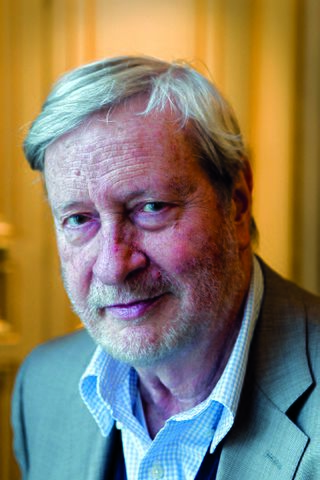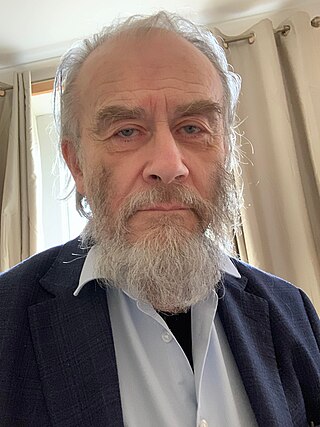
Nihilism is a family of views within philosophy that rejects generally accepted or fundamental aspects of human existence, such as knowledge, morality, or meaning. The term was popularized by Ivan Turgenev and more specifically by his character Bazarov in the novel Fathers and Sons.

René Descartes was a French philosopher, scientist, and mathematician, widely considered a seminal figure in the emergence of modern philosophy and science. Mathematics was central to his method of inquiry, and he connected the previously separate fields of geometry and algebra into analytic geometry. Descartes spent much of his working life in the Dutch Republic, initially serving the Dutch States Army, later becoming a central intellectual of the Dutch Golden Age. Although he served a Protestant state and was later counted as a Deist by critics, Descartes was Roman Catholic.
Amorality is an absence of, indifference towards, disregard for, or incapacity for morality. Some simply refer to it as a case of not being moral or immoral. Amoral should not be confused with immoral, which refers to an agent doing or thinking something they know or believe to be wrong.

Ernst Alfred Cassirer was a German philosopher. Trained within the Neo-Kantian Marburg School, he initially followed his mentor Hermann Cohen in attempting to supply an idealistic philosophy of science.

Gary Lawrence Francione is an American academic in the fields of law and philosophy. He is Board of Governors Professor of Law and Katzenbach Scholar of Law and Philosophy at Rutgers University in New Jersey. He is also a visiting professor of philosophy at the University of Lincoln (UK) and honorary professor of philosophy at the University of East Anglia (UK). He is the author of numerous books and articles on animal ethics.
Karl Löwith was a German philosopher in the phenomenological tradition. A student of Husserl and Heidegger, he was one of the most prolific German philosophers of the twentieth century.

Gianteresio Vattimo was an Italian philosopher and politician.

Stephen Richard Lyster Clark is an English philosopher and professor emeritus of philosophy at the University of Liverpool. Clark specialises in the philosophy of religion and animal rights, writing from a philosophical position that might broadly be described as Christian Platonist. He is the author of twenty books, including The Moral Status of Animals (1977), The Nature of the Beast (1982), Animals and Their Moral Standing (1997), G.K. Chesterton (2006), Philosophical Futures (2011), and Ancient Mediterranean Philosophy (2012), as well as 77 scholarly articles, and chapters in another 109 books. He is a former editor-in-chief of the Journal of Applied Philosophy (1990–2001).

Gillian Rosemary Rose was a British philosopher and writer. Rose held the chair of social and political thought at the University of Warwick until 1995. Rose began her teaching career at the University of Sussex. She worked in the fields of philosophy and sociology. Her writings include The Melancholy Science, Hegel Contra Sociology, Dialectic of Nihilism, Mourning Becomes the Law, and Paradiso, amongst others.

Animal rights is the philosophy according to which many or all sentient animals have moral worth independent of their utility to humans, and that their most basic interests—such as avoiding suffering—should be afforded the same consideration as similar interests of human beings. Broadly speaking, and particularly in popular discourse, the term "animal rights" is often used synonymously with "animal protection" or "animal liberation". More narrowly, "animal rights" refers to the idea that many animals have fundamental rights to be treated with respect as individuals—rights to life, liberty, and freedom from torture that may not be overridden by considerations of aggregate welfare.

Abolitionism or abolitionist veganism is the animal rights based opposition to all animal use by humans. Abolitionism intends to eliminate all forms of animal use by maintaining that all sentient beings, humans or nonhumans, share a basic right not to be treated as properties or objects. Abolitionist vegans emphasize that the production of animal products requires treating animals as property or resources, and that animal products are not necessary for human health in modern societies. Abolitionists believe that everyone who can live vegan is therefore morally obligated to be vegan.
Contemporary debates about animal welfare and animal rights can be traced back to ancient history. Records from as early as the 6th century before the common era (BCE) include discussions of animal ethics in Jain and Greek texts. The relations between humans and nonnhumans are also discussed in the books of Exodus and Genesis, Jewish writings from the 6th or 5th century BCE.
The Modern Project is a general name for the political and philosophical movement that gives rise to modernity, broadly understood. The modern project begins in the late Middle Ages or the Renaissance. Retrospectively philosophers, scientists, and other historical figures in Western culture can be seen during that period as displaying a greater proclivity to question the givenness of the world — a givenness espoused in classical philosophy and Judeo-Christian revelation — and to assert the centrality of the human mind as the basis for human power. The various ideated abstractions and views associated with the Modern Project include: materialism, determinism (metaphysics), rationalism, empiricism, skepticism (epistemology), utilitarianism, hedonism, moral relativism (ethics), atheism, nihilism, secularism, humanism (religion), individualism, egalitarianism, cosmopolitanism (sociology), capitalism, socialism, communism (economics), and progressivism, liberalism, democracy, constitutionalism, nationalism (politics).
Richard Allan Watson was an American philosopher, speleologist and author.

Robert Garner is a British political scientist, political theorist, and intellectual historian. He is a Professor Emeritus in the politics department at the University of Leicester, where he has worked for much of his career. Before working at Leicester, he worked at the University of Exeter and the University of Buckingham, and studied at the University of Manchester and the University of Salford.
This a list of the published works of English philosopher Roger Scruton.
David DeGrazia is an American moral philosopher specializing in bioethics and animal ethics. He is Professor of Philosophy at George Washington University, where he has taught since 1989, and the author or editor of several books on ethics, including Taking Animals Seriously: Mental Life and Moral Status (1996), Human Identity and Bioethics (2005), and Creation Ethics: Reproduction, Genetics, and Quality of Life (2012).

The relationship between Christianity and animal rights is complex, with different Christian communities coming to different conclusions about the status of animals. The topic is closely related to, but broader than, the practices of Christian vegetarians and the various Christian environmentalist movements.











